Italian Author Elena Doni: Writing Fakhra Younas’ Life Story
Backstory. The memoir, “Il volto cancellato” by Fakhra Younas with Elena Doni, is the story of a Pakistani woman who started life in Karachi’s red light district, became famous as a dancer and movie star, and then was unspeakably disfigured by an acid attack.
Fakhra married her “prince”, the son of the former governor of Pakistan’s most important province, Punjab, but left him after 3 years due to domestic abuse. May 14, 2000, while at her mother’s, her husband attacked her with burning acid “erasing her face”. The attack was so damaging, she would spend months in the hospital. Then her husband kept her captive in a far away country mansion. Fakhra escaped with the help of her mother-in-law, Pakistani author Tehmina Durrani, a former wife of the governor. Tehmina would take her to Italy, where Tehmina had many friends. On the day that he received Fakhra in his office,opening the windows facing the ruins of ancient Rome in the foreground and modern buildings beyond, the mayor of Rome, Walter Veltroni said: “This city will not forsake you.” And they didn’t, though it wouldn’t be enough to save her life.
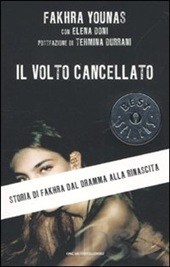
Cover of Il volto cancellato by Fakhra Younas with Elena Doni
Horribly disfigured, Fakhra needed surgery desperately to survive. Fakhra would have 39 operations in all led by the surgeon Professor Valerio Cervelli. She did not regain beauty, but her face, although scarred, was a “normal” face. In 2005, Italian journalist Elena Doni was invited to work with Fakhra to write her memoir, Il volto cancellato (The Erased Face).
In February 26, 2012, a Pakistani-Canadian director, Sharmeen Obaid Chinoy, won an Oscar for Saving Face, a documentary about acid attacks on women in Pakistan, attracting world attention. (Fakhra, living in Rome, was not included in the documentary.) Although not her first attempt, on March 17, Fakhra left a suicide note despairing for a lack of justice for acid attacks in Pakistan and ended her life. — Summary by Elena Doni and Anora McGaha
News of her tragic life and death traveled the world, one news story at a time, spreading through Twitter, leading WWWB editor to Italian journalist, Viviana Mazza, on Twitter, who offered to facilitate the connection with Elena Doni . Elena generously agreed to this story, and answered questions about working with Fakhra on her memoir.
On Friday June 1, 2012, thanks to the efforts of Viviana Mazza, we publish 3 variations of this story in three continents: in Italy on La27esima ora, the women’s blog of newspaper Corriere della Sera; in Pakistan in the newspaper Dawn; and in the United States, here on “Women Writers, Women Books“.
—
Elena Doni.
In 2003, I wrote Fakhra Younas’ story for the magazine “Il Venerdì”, issued Fridays with Italy’s biggest daily newspaper, “La Repubblica”. Fakhra was almost unknown to the Italian people: she had been on TV only once. Fakhra spoke Urdu, only a few words of Italian, and possibly less English. She did not read or write. I had no idea at the time that Italy or Europe would be interested in a book about her life.
Two years later, I received a call from one of Italy’s three most important publishers, Mondadori. Ms. Ungarelli, asked if I would write a book on Fakhra’s story. I agreed, intending for Fakhra to have all the revenue, though ended up accepting 5%.
I was then working as a TV and radio journalist and so arranged for a few days off to meet with Fakhra. I began by recording and writing simultaneously. We would meet in the afternoons, at her place or mine, but she tired after a couple of hours. Often she told me details or sensations when I was driving her back home, which I would write down as soon as possible in a booklet.
Fakhra told me about her childhood, when she and her brothers were so terribly hungry, when they slept among the ruins of a mosque and later on, when she realized that men became crazy for her dancing and threw plenty of money at her feet. She was not yet 20 when she became a star, an actress in two movies, and she already had a son, Noman, who came with her to Italy.
It would take nearly one year for Fakhra to remember and for me to learn about and write her life, but we finished. The book sold very well, and was translated into French and German (though not yet in English or Urdu). Sales of Il volto cancellato gave Fakhra a very comfortable amount of money, and she also had a regular although modest amount of money from the city of Rome.
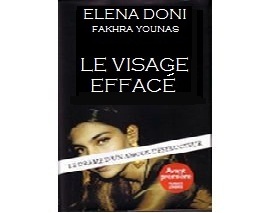
The French translation of Il volto cancellato, "Le Visage Efface" by Elena Doni and Fakhra Younas
Fakhra was human and had her ways. She didn’t save and was not shy about asking for money from the people she met, friends or strangers. She was not an easy patient; she often didn’t follow the doctor’s prescriptions. And she was a difficult friend for me, always wanting a double check on what I was writing about her.
In time, I appreciated her sense of humor and gained patience with her crazy desires. One day I was driving on a highway and she was sitting next to me when, all of a sudden, she said: “I want to have a driving license because I will buy a car and drive it myself.” I was driving slowly enough to show her a big green board on the side of the highway with a large white arrow pointing to the word “ROME”. I asked her to read it. And Fakhra, impatient, replied. “You know very well that I don’t want to learn to read!” None of her friends could talk her into learning to read even a few words. Fakhra never learned to read or to drive, yet she always managed to have someone to drive her where she wanted to go.
Writing Fakhra’s memoir was meaningful from the human point of view; she was such an unhappy, fragile person that I really did hope it would help her. We believed we were doing something to help other women, and we had hoped her story would help change “acifidication” in Pakistan. (Though it seems more is being accomplished since her death than previously.)
Fakhra had changed a lot by the last time I met her in 2010, but I will remember her humor and her generosity. She gave wonderful presents to those she liked, including giving me a pretty necklace of strange little stones which I keep on my desk to this day.
—
Elena Doni‘s books include: Il volto cancellato; Il secolo delle donne; and Donne del Risorgimento written with a feminist collective, “Controparola”. She is currently working on a TV film, “witnesses of our time”, with interviews of famous writers and journalists that she collected ages ago.
The photo of Elena Doni with a rose petal is from Aidos.it’s campaign for getting signatures to end FGM.
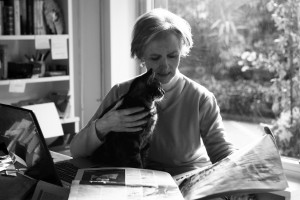
Italian Journalist and feminist author, Elena Doni in her home library
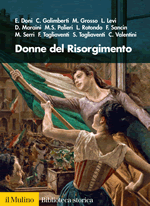
Donne del Risorgimento, an Italian book written by the feminist collective Controparole
Category: Contemporary Women Writers, Italian Women Writers, Pakistani Women Writers, Women Writing Memoirs

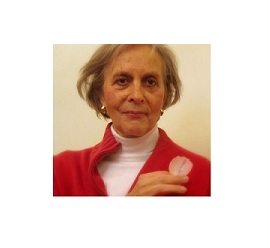



Very beautiful. Elena is a great and brave fighter against fundamentalism and a friend for us, Moslem women.
Adele Foroughi
This article is inspiring for me as a writer. I know several people with remarkable stories, and hope that I can be a written voice for some of these as Elena Doni was for Fakhra.
Thank you so much for reading this post. Fakhra’s death galvanized me, and in fact the world, as I watched the tweets move from country to country on Twitter, as the news centers picked it up. Doing the research I discovered the book, and saw Elena’s name, but never imagined I might have a connection with her. Now I know of Elena’s other work and would love to read it.
This month it will be 5 months since Fakhra ended her life. And sulfuric acid is probably still available to anyone for pennies on the streets of South Asia. But her story and her death did awaken people, and in time the laws will change. The day will come, we can pray, when no one would dare throw acid on another living being.
Telling stories can change people’s lives, and helping those who can’t tell their own stories (Fakhra couldn’t write) is a VERY rewarding task. Thanks again for your note Reagan. – Anora
It is with tremendous appreciation that I thank Viviana Mazza of Italy’s Corriere della Serra and 27esimaora for making it possible to connect with Elena Doni, and for developing a 1 story, 3 versions, 3 continents concept and seeing it through.
1. Italy’s 27esimaora news blog
2. Pakistan’s Dawn epaper
3. United States of America’s Women Writers, Women Books online magazine
It is an honor to be able to connect with Elena Doni herself, after seeing her name on Fakhra Younas’ book covers week after week while following and researching Fakhra’s tragic story as it traveled around the world in the weeks after March 17. It is amazing to break through the glass window separating news from my life and get to ask and get answers about questions related to her work with Fakhra in writing Fakhra’s memoir. (The memoir is still available in Italian, and the publishers have yet to sell the rights to an English language publisher, so no English language translation on the horizon.)
And a big thank you to Hafsa Adil, for her part in editing and publishing a version of this story for Dawn.
Those of you who read Italian will be able to see and learn fascinating details that emerged only in the Italian version. And reading all three is an interesting exercise in seeing what each editor felt suitable for their readers.
Viviana Mazza made the initial connection with Elena Doni, then when Elena sent her story with followup information, Viviana translated the WWWB post into Italian, and developed it further from knowledge she had, for 27esimaora, and she made the connection with Pakistan’s Dawn. @MazzaViviana on Twitter.
Hafsa Adil edited the version for Dawn in Pakistan, and added a photo. @hafsa_adil on Twitter.
—Anora McGaha – Editor, Women Writers, Women Books